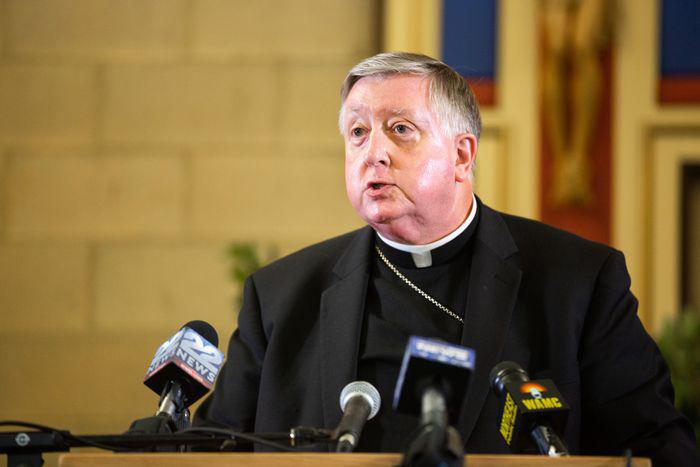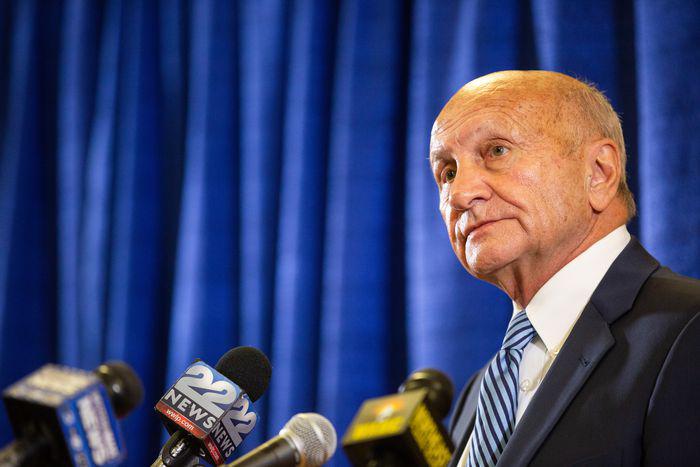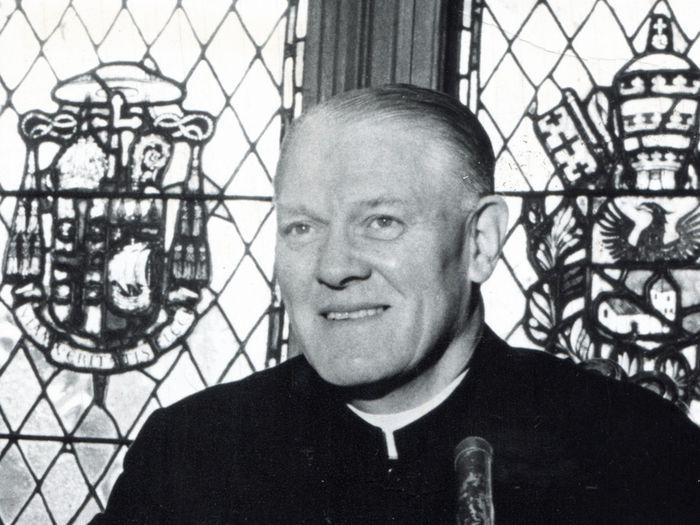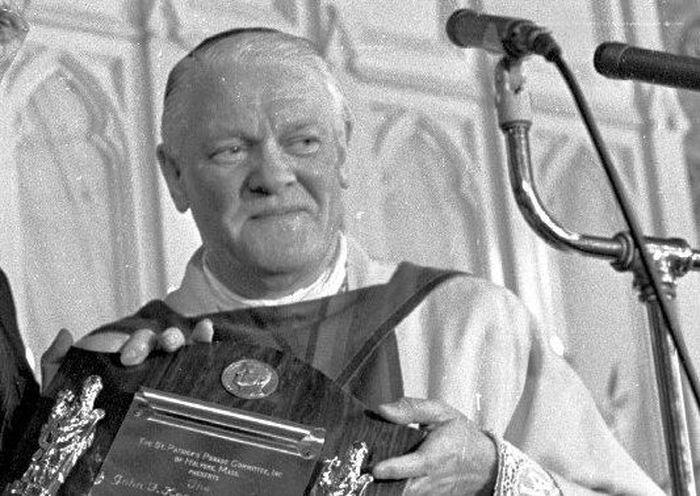|
Rancor on Springfield Diocesan Review Board leads to resignations, lapse in faith
By Stephanie Barry
The Roman Catholic Diocese of Springfield’s volunteer Diocesan Review Board has begun bleeding members in the wake of the so-called Weldon Report, with one intending to abandon the church altogether. A 350-page analysis released in late June, authored by retired Judge Peter Velis, found the late Bishop Christopher J. Weldon repeatedly raped a young boy during the early 1960s. The victim told investigators Weldon was part of a cabal of priests who sexually passed around young boys at a rectory and campground during that era. Weldon was leader of local Catholic churches from 1950 to 1977. He died in 1982. The Diocesan Review Board is tasked with hearing accounts of alleged clergy abuse and assessing their credibility for church officials, who can then recommend a variety of repercussions to the Vatican. After the report was released, there has been rancor between some board members and the diocese focused on the handling of the victim’s early disclosures. Any whiff of an attempted cover-up should be assigned to the diocese and not the board, two members argue, although a spokesman for the church says there was not one. Longtime member Theresa Finnegan and Chairman John Hale resigned from the panel this week, contending a former diocesan investigator and diocesan staff manipulated the initial investigation and left the volunteer board to appear culpable in both the report and media coverage. “I strongly feel that any wrongdoing was done by the employees of the diocese and not the Review Board,” said Finnegan, an attorney from Wilbraham. “We’re volunteers giving our time to try to make the church a safer place and it’s not an easy job.” Hale said he felt similarly hung out to dry by the diocese and resigned from the board after 16 years. Moreover, the experience defeated his faith and he plans to leave the Catholic church. “I just don’t believe people who can be so callous about thoughts and feelings should be in charge of my salvation,” Hale said. The victim told investigators that Weldon was particularly violent and “known for slapping.” He said he was between 8 and 10 years old when Weldon and two other priests began assaulting him. “I was raped. I don’t like that word, rape. Weldon touched me down there and I fought. I started to cry and Weldon kicked me out of bed stating: ‘You’re not supposed to cry,’” according to Velis’ report. The Weldon report set off a wave of reforms within the Springfield diocese — which has been battered by clergy abuse scandals for decades — including the formation of a task force by outgoing Bishop Mitchell Rozanski, who will be installed as an archbishop in St. Louis next month. Weldon’s name will be stripped from a Mercy Medical Center rehabilitation facility. Portraits of him will be banished from diocesan properties. His remains will be exhumed from Gate of Heaven Cemetery and moved to a spot with a less ornate gravestone. In Hale’s criticism of church officials, he specifically cited Mark Dupont, communications director for the diocese. Dupont responded that many stakeholders were initially misled by a report from a private investigator hired by the church. While Dupont rebuffed requests by Finnegan and Hale to defend them publicly following the report, he said during an interview Friday that all had been misled by conflicting reports offered by onetime investigator Kevin Murphy, a retired state trooper. “I think the board was given bad information and acted on bad information and that’s not their fault any more than it’s my fault,” Dupont said, adding that he was saddened by the departures of the board members under these circumstances, commending them for their service. He added, “In no way was Mr. Hale pressured into signing on to the Berkshire Eagle statement, a fact which I think is clearly supported by his two email responses to me that day — neither would indicate he was being pressured and both signal his clear approval. Again everything I knew about this matter I learned from the now contested investigative reports and persons including Mr. Hale who had firsthand knowledge.” Murphy submitted one report that said Weldon never personally abused the victim, then a second amending that conclusion. Finnegan said all board members in 2018 initially concluded that, whether Weldon physically touched the boy or not, he was culpable — even as an observer — and reported that to the diocese. The narrative began to unravel when a Berkshire Eagle reporter called the diocese in 2019, inquiring why Weldon’s name was not included in an updated list of known abusers. Dupont placed a frantic call to Hale, who said he was on a golf course, and would refer later to his notes from his interview with the victim nearly a year earlier. “It was a very distracted conversation. I don’t think it was fair to make that conversation a cornerstone of that report,” Hale said. Dupont argues Hale signed off on a statement to the Berkshire Eagle absolving Weldon of any direct abuse. Hale says now he always believed Weldon was involved in some way. Dupont polled other review board members, including Finnegan, according to the report. She said during an interview that she told church officials the victim’s account sounded like “an orgy” and whether Weldon was actively involved or merely a voyeur, she still regarded him as a predator, as did the rest of the board. “I absolutely remember when the victim began talking about Weldon during his interview with us. As a child, Bishop Weldon was a revered name in my house. My mother used to encourage us to go up and kiss his ring,” Finnegan said. As the Berkshire Eagle pressed for more information on Weldon, emails between Dupont and longtime diocesan attorney Jack Egan show they were struggling for a response. “Mark, I would take out the reference to Bishop Weldon being present. It sounds like he was watching. At the end it should be that the individual said Bishop Weldon never abused him. On the possibility of Bishop being present, I would say that the allegation was Bishop had actual knowledge of the abuse or he should have known because he was present at a gathering where some abuse took place,” Egan wrote to Dupont on May 31, 2019. “Can we say it was a large gathering I can’t tell.” “Also, I think we should lead with an allegation of abuse in the 1960s and the victim didn’t recover his memory until around 2017 or 2018,” Egan adds. Dupont went forward with a statement that squared with Egan’s advice, and Hale signed off on it, the emails show. But Velis reported Hale felt “pressured” by diocesan officials. Velis’ report finds the victim — who has never been publicly identified — was “unequivocally” a victim of systemic abuse at the hands of clergy including Weldon. Other dead priests the man accused were Clarence Forand and Edward Authier. Those allegations were found credible before Rozanski ordered the report into the Weldon accusations. The disconnect among the board members seemed to hang, in part, on one ambiguous question and answer. “Are you saying Bishop Weldon never abused you?” Hale asked during the board’s meeting with the victim. The man replied: “No,” which could have meant no I’m not saying that, or no he didn’t, according to Velis’ analysis. Velis concluded the former. Velis said that while he found the investigatory process within the diocese woefully flawed, he believes the board would have come to a distinctly different conclusion had Murphy’s first report not deflected responsibility from Weldon. “They were contradictory in nature. If they initially had the benefit of one report, versus the one that was either vague or not said at all you can reasonably infer they would have more than likely have arrived at a different conclusion,” said Velis, who recommended a number of reforms to the diocese going forward. The retired Hampden County Superior Court judge said the Catholic church has historically been plagued by three words. “Delay, deny and cover-up. That is the most common refrain among critics of the Catholic church,” Velis said on Friday. Dupont maintains the diocese did none of the above. “I have one goal here, which is to be forthright with information that I know. Do I regret sending out the statement that went out to the newspaper knowing what I know now, absolutely. But was it done intentionally? No,” he said. Contact: hnguyen@repub.com
|
.
Any original material on these pages is copyright © BishopAccountability.org 2004. Reproduce freely with attribution.



